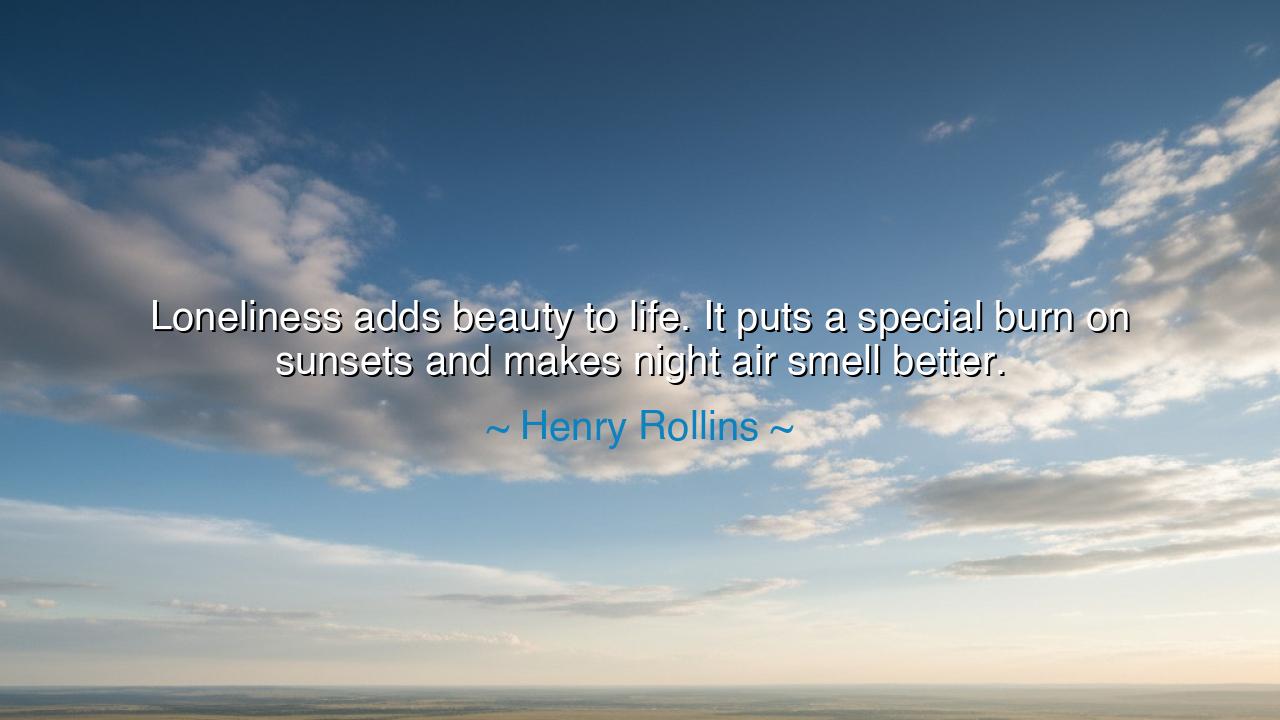
Loneliness adds beauty to life. It puts a special burn on sunsets
Loneliness adds beauty to life. It puts a special burn on sunsets and makes night air smell better.






“Loneliness adds beauty to life. It puts a special burn on sunsets and makes night air smell better.”
Thus spoke Henry Rollins, the fierce voice of a restless age — a man who turned pain into power, and solitude into song. His words, though born from modern fire, echo the wisdom of the ancients. For through them, he teaches that loneliness, though sharp and aching, is not a curse but a lens — a way of seeing the world more deeply, more vividly, more alive. The lonely heart, stripped of distraction, begins to notice what the crowded soul cannot: the trembling of the wind at dusk, the quiet gold of the fading sun, the fragrance of night as it opens like a flower. Loneliness, when embraced, becomes an artist — painting the ordinary with divine light.
To feel lonely is to feel the edges of one’s humanity. It is the soul’s reminder that it was made for connection, yet also capable of standing alone. When Rollins speaks of beauty arising from loneliness, he does not romanticize pain — he transforms it. He tells us that separation sharpens perception. When the heart is emptied of noise and companionship, even the smallest gesture of life becomes immense. A single star gleaming in the black sky becomes a revelation. The stillness of the world ceases to be emptiness; it becomes sacred awareness.
The origin of such wisdom lies in Rollins’ own journey. As a musician, writer, and wanderer, he lived much of his life on the road — far from home, far from those who might comfort him. Yet instead of letting loneliness devour him, he used it as fuel for creation. In the silence of empty hotel rooms and long stretches of night, he wrote words that burned with raw honesty. He learned that loneliness can either crush or cleanse, depending on whether one resists or welcomes it. Through solitude, he discovered a strange truth: when all else falls away, beauty reveals itself more fiercely, as if the world itself seeks to comfort the watcher who stands alone.
This insight is not Rollins’ alone. The poets and sages of old spoke the same truth in softer tongues. The mystic Rumi once wrote, “The wound is the place where the light enters you.” And the Japanese poet Bashō, wandering alone through the mountains, found in silence the purest poetry. The ancients knew that loneliness refines perception, for it draws the senses inward until the smallest detail becomes luminous. The lonely heart becomes a mirror — reflecting the vastness of existence back upon itself.
Consider the story of Vincent van Gogh, who painted the world in flames of color though his life was steeped in solitude. To him, the night sky was not dark; it was alive — pulsing with stars and meaning. His loneliness did not blind him to beauty; it magnified it. Through his pain, he saw the divine spark in every field and face. So too does Rollins remind us: loneliness is not the absence of beauty, but the state that teaches us to see it. When the world grows quiet, the eyes grow sharper, the spirit more tender, and the heart more awake.
To embrace loneliness is to learn reverence — for life, for time, for one’s own company. It is in those moments of solitude that we come to know ourselves without disguise. The mind, no longer distracted, begins to hear the subtle music of existence. The wind becomes a voice, the stars a council of old gods, the setting sun a reminder that endings too can be beautiful. Loneliness, then, is not an enemy but a teacher — one that whispers: “Be still, and behold.”
The lesson of Rollins’ words is this: do not flee your loneliness. Sit with it. Walk beneath the fading light and let the sunset burn against your skin. Listen to the night air; breathe it in until it fills your spirit. For these moments are not empty — they are holy. They are the times when the universe speaks most clearly, when beauty hides behind sorrow, waiting to be seen by those brave enough to stand alone.
And when you rise from your solitude — calmer, wiser, more alive — you will carry with you a new kind of sight: the vision that loneliness has granted you. You will see beauty where others see nothing, hear harmony where others hear silence. You will have learned what Rollins knew: that loneliness adds beauty to life, not by giving more to the world, but by awakening more within you.






AAdministratorAdministrator
Welcome, honored guests. Please leave a comment, we will respond soon